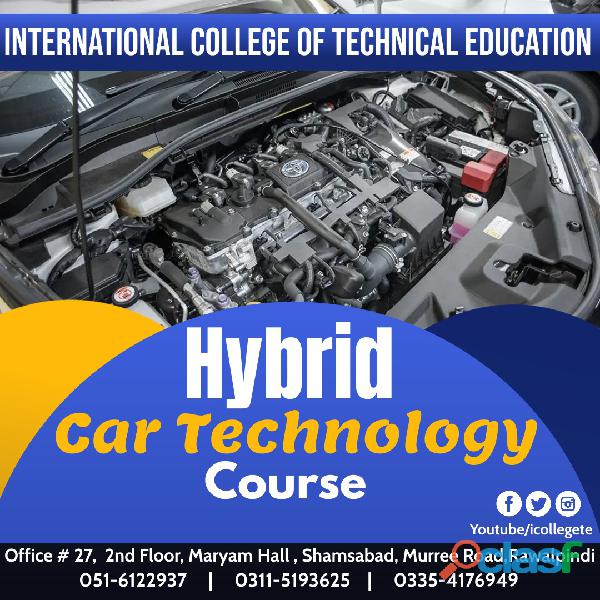NO 1 HYBRID CAR TECHNOLOGY EFI COURSE IN RAWALPINDI SHAMSABAD IN AHMADPUR EAST
ICTE
International College of Technical Education Pvt. Ltd
Head Office :
Office # 27, Second Floor, Maryam Shadi Hall Plaza
(Airies Plaza), Shamsabad, Murree Road,
Rawalpindi, Pakistan 46000.
Email : info@icollegete.com
Contact : 051-6122937, 0311-5193625, 0092-335-4176949
Hybrid electric vehicles are powered by an internal combustion engine and one or more electric motors, which uses energy stored in batteries. A hybrid electric vehicle cannot be plugged in to charge the battery. Instead, the battery is charged through regenerative braking and by the internal combustion engine.Hybrid Electric Vehicle Course is a professional course wherein students are taught dynamics, charging, battery assembling, designing engines, interior and exterior spacing, etc. of hybrid electric vehicles.How hybrid and electric vehicles work and their advantages and disadvantages, their hybridization, Autonomous Electric Vehicles, batteries, and charging systems. We will study few important topics that you should know.Electric vehicles aren't just an efficient way to move people and products—they are literally powering the transition to a clean energy economy by taking on one of the largest contributors to greenhouse gas emissions—transportation.In this online course, you will get a comprehensive overview of hybrid and electric vehicle systems, battery technologies, the charging infrastructure, and grid integration and be able to apply what you’ve learned toward a career in this exciting new field.
Explain the role of electric vehicles in the clean-energy transition
Evaluate the challenges of integrating electrified vehicles into the electric grid
Ascertain the advantages and disadvantages between hybrid electric vehicle (HEV), plug-in hybrid electric vehicle (PHEV), and battery electric vehicle (BEV) systems
Comprehend role and design of battery management systems (BMS) and applications
Understand battery technologies including lithium-ion batteries, cell balancing, battery capacity, and aging factors
Evaluate the basics of charging technologies, and future solutions such as fast charging strategies, wireless charging, and battery swapping
The course will cover all of the following with details:
Electric Vehicles Introduction
Hybrid Vehicles Introduction
Types of Electric Vehicles and Range Anxiety
Advantages and Disadvantages of Hybrid Vehicles
Principle of Energy Hybridization of Hybrid Electric Vehicle
Hybridization of drivetrains in Hybrid Electric Vehicles
Vehicular Efficiency and Energy Saving Potential
Autonomous Electric Vehicle
Google's Self Driving Autonomous Electric Vehicle
Battery range, life, and recycling
Types of Batteries used in Hybrid Electric Vehicle
Charging Stations of Electric Vehicles
Charging Time of an Electric Vehicle
Charging Methods of an Electric Vehicle
International College of Technical Education Pvt. Ltd
Head Office :
Office # 27, Second Floor, Maryam Shadi Hall Plaza
(Airies Plaza), Shamsabad, Murree Road,
Rawalpindi, Pakistan 46000.
Email : info@icollegete.com
Contact : 051-6122937, 0311-5193625, 0092-335-4176949
Hybrid electric vehicles are powered by an internal combustion engine and one or more electric motors, which uses energy stored in batteries. A hybrid electric vehicle cannot be plugged in to charge the battery. Instead, the battery is charged through regenerative braking and by the internal combustion engine.Hybrid Electric Vehicle Course is a professional course wherein students are taught dynamics, charging, battery assembling, designing engines, interior and exterior spacing, etc. of hybrid electric vehicles.How hybrid and electric vehicles work and their advantages and disadvantages, their hybridization, Autonomous Electric Vehicles, batteries, and charging systems. We will study few important topics that you should know.Electric vehicles aren't just an efficient way to move people and products—they are literally powering the transition to a clean energy economy by taking on one of the largest contributors to greenhouse gas emissions—transportation.In this online course, you will get a comprehensive overview of hybrid and electric vehicle systems, battery technologies, the charging infrastructure, and grid integration and be able to apply what you’ve learned toward a career in this exciting new field.
Explain the role of electric vehicles in the clean-energy transition
Evaluate the challenges of integrating electrified vehicles into the electric grid
Ascertain the advantages and disadvantages between hybrid electric vehicle (HEV), plug-in hybrid electric vehicle (PHEV), and battery electric vehicle (BEV) systems
Comprehend role and design of battery management systems (BMS) and applications
Understand battery technologies including lithium-ion batteries, cell balancing, battery capacity, and aging factors
Evaluate the basics of charging technologies, and future solutions such as fast charging strategies, wireless charging, and battery swapping
The course will cover all of the following with details:
Electric Vehicles Introduction
Hybrid Vehicles Introduction
Types of Electric Vehicles and Range Anxiety
Advantages and Disadvantages of Hybrid Vehicles
Principle of Energy Hybridization of Hybrid Electric Vehicle
Hybridization of drivetrains in Hybrid Electric Vehicles
Vehicular Efficiency and Energy Saving Potential
Autonomous Electric Vehicle
Google's Self Driving Autonomous Electric Vehicle
Battery range, life, and recycling
Types of Batteries used in Hybrid Electric Vehicle
Charging Stations of Electric Vehicles
Charging Time of an Electric Vehicle
Charging Methods of an Electric Vehicle
4.00/5
1 reviews




CONTACT




